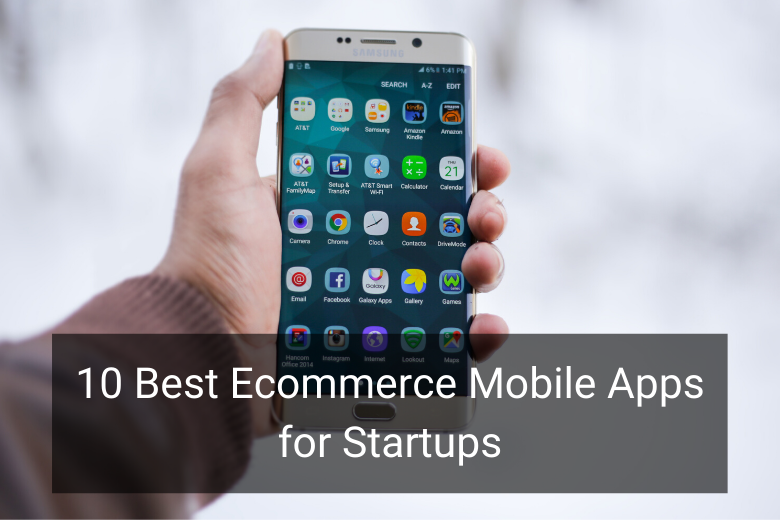With the world digitalizing, every business is looking for its place in the vast cyberspace. The internet is not only a way to stay connected or look up information, but it is also a way to target the global audience at one time. The e-commerce industry is gaining recognition at an increasingly fast pace with the growing use of the internet by consumers around the world. Most people now opt for on-line shopping for all their essentials instead of wasting time roaming the malls. Plus, with the competition in the corporate world, having an e-commerce website is an added advantage to your brand image. Here are 10 best ecommerce mobile apps for startups that will help you bring some attention to your business.
Startups must pay attention to the needs of smartphone users when starting their business as mobile users comprise most of the sessions on the internet. Hiring app development agencies for their mobile app services and designing applications that target the average youth and enterprise market will also increase customer engagement for your brand. If you run a company or have an idea for a startup, you should be aware of the e-commerce platforms. These tools help you optimize your website design, fix sales funnels, and bring more traffic to your domain.
Here are some of the tools to get you started:
Website tools
You’ll find all kinds of e-commerce tools that help with diverse aspects of the eCommerce industry, from the website builders to the optimizers, plugins, marketing, and analytics tools. Some platforms provide you the techniques to set up the website and manage it. Here are three of them:
1. WooCommerce
WooCommerce is a WordPress plugin that offers users a variety of features. It is modular with powerful analytics, fast, and fit for any eCommerce business. It is a free plugin with a few additional features available on purchase. The unique attribute of WooCommerce is that the vast community of developers and the variety of plugins enable you to add any feature with ease.
The platform is the best option for convenient and hassle-free integration of your e-commerce business with WordPress. However, you note that adding too many plugins, paid or free, can affect the speed of the website and security.
2. Shopify
Shopify is useful for those entrepreneurs with minimal technical skills and no funds to hire a developer. It is a fully hosted eCommerce solution, secure and scalable, and tons of features, an omnichannel with responsive checkout.
It is one of the biggest e-commerce brands that offer various price packages based on the development stages of your business, including startups. You can get tools for brand marketing, put up your store on eBay and Amazon, and more all from one dashboard.
Shopify is one e-commerce application for startups that offers convenient setup, fast loading speed, and secure payment portals. It provides you the tools you need from choosing a domain name, launching a website, shipping integration, and more. You can perform other tasks, including adding inventory, customization, payment, and tax settings, and more in minimal time.
3. PrestaShop
Use PrestaShop if you want a completely free e-commerce platform. It is on par with WooCommerce and Shopify in the number of features. For an unpaid platform, it is one of the best options.
Additionally, the platform is SEO-friendly. If you use it to build your website, it will give you further visibility on search engines. You also have access to a panel of developers to help you in any coding part of building a website. It is compatible with 40 languages so that you can run your store in any style you choose.
However, a disadvantage with PrestaShop is that it is difficult to upscale if your brand grows too
quickly.
Marketing tools
After building your website, these e-commerce marketing tools will help build brand image, drive traffic, increase customer base, and more:
4. MailChimp
For a startup, you should create your email list when you start your marketing strategy. Managing tons of emails, a day can be a hassle, but that is where MailChimp helps. The e- commerce app can help you drive traffic to your website via email marketing. It is an automated tool that comes equipped with customizable templates, segmentation features, and more. It is one of the top email marketing tools for e-commerce businesses. From startups to established enterprises can access its features, including analytics-heavy backend.
5. Active Campaign
Active Campaign is another marketing e-commerce platform that offers you the chance to run single campaigns or email marketing. The user interface is a little sketchy, but the platform allows for updates and alterations based on user suggestions. It has accurate analytics that will help you sort through the resulting data. Additionally, it is a free platform but also has various paid plans based on the contacts in your list and your user accounts. At a price, you can also review how the campaign will look on different devices, including smartphones and browsers.
6. User Testing
The user experience and how your audience interacts with your website is an essential part of optimizing your eCommerce store for exceptional UI/UX. User Testing is one eCommerce application that provides insight into the target market, their response to the store and site. It cumulates responses from the global audience that fit your target market parameters in the form of live videos that show the users’ reactions to your site or mobile app. The advantage the platform presents is that you get uncensored responses from worldwide in a short time.
Additionally, you can also customize the questions to ask your target audience.
Analytics Tools
Analytics tools help you understand how well your marketing strategies are working, and if there are any leaks in your sales funnels. Here are some of the tools that you can use:
7. VWO
With heat maps and click maps, Visual Website Optimizer is one of the analytics tools that go beyond the traditional analysis techniques. The heat maps can show how your visitors navigate your website, where they spend most of their time and where they stay away. When you know your users’ way of using your website, it’ll be easier to optimize the UI/UX of the design. Additionally, the platform integrates with other e-commerce platforms and enables you to analyze, edit, and target campaigns.
8. Optimizely
Optimizely uses sequential testing for its analytics features. It is a powerful tool that helps you evaluate your performance. You’ll find five e-commerce tools within the platform and one tool for televisions. Pricing is custom quoted, and a free trial is also offered so you can use the tools for your startup.
9. Google Analytics
Google Analytics is one of the most favored analytics tools by e-commerce businesses. It can help you improve conversions on PPC ads, optimize the site design, website content, and more. It is a free platform that also offers training to first-time users. Additionally, you can track visitor behavior and understand how your target audience navigates the website.
10. Neatly
It’s not enough to know how the website performs; you also need to organize yourself. Neatly helps you plan your days, track and organize your project goals. It also provides insights to improve your marketing strategies, and within a single dashboard, you can track your KPIs. Additionally, the tool can integrate with other e-commerce platforms, including Shopify, MailChimp, PayPal, and Google Analytics. It has a lifetime membership fee but is virtually free with some paid features. A point to note is that the platform limits the number of companies accessing Neatly at a time.
Build Your E-commerce Mobile Application!
Many more e-commerce applications offer analytics and business tools that help you manage day-to-day logistics, operations, and analyze how well your website is performing.
These tools can help you spot the bugs in your website design, improve user experience, and judge how well your marketing strategies are working. Utilizing the platforms will ensure the success of your startup in the long run.
So, are you ready to start your business?
Author Bio
Olivia Marie is a Digital Content Producer at Cubix; a software development company, headquartered in Florida, U.S. She is a passionate writer with expertise in Blockchain, AI, digital marketing, and more.

Ready To Upgrade Your Logistic Solution?
Speak to Floship ecommerce logistic consultant about improving your global support chain today





